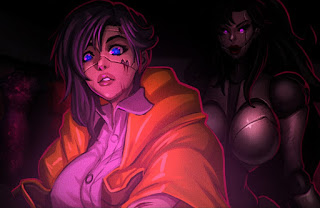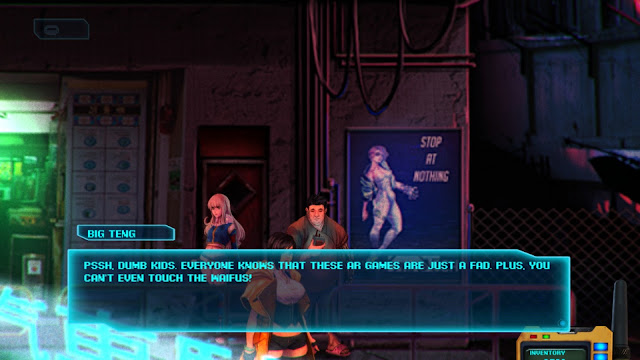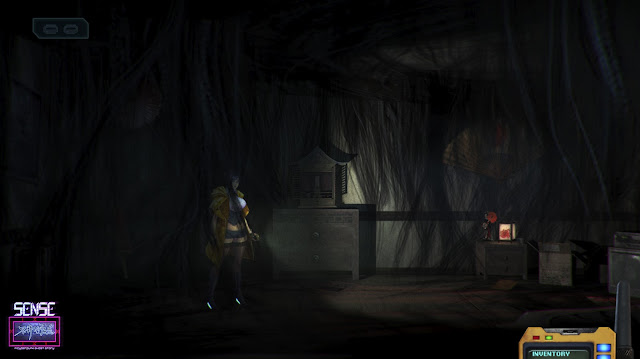Cyberpunk is not an aesthetic. Cyberpunk is not an aesthetic. Cyberpunk is not an aesthetic. I feel like I have been saying this non-stop for the last year because game developers seem to have watched Blade Runner, read some Gibson, and come out the other end with the assumption that cyberpunk, the genre, is neon and augmentations and holograms and little else. Sense: A Cyberpunk Ghost Story is, as far as I can tell, a “cyberpunk” adventure because it let them put big boobs and robot eyes in the game or something. There’s very little evidence that the developer has any understanding of the genre beyond such superficial aesthetics.
In fact, one of the rare moments of the game where it deals with cyberpunk themes shows how utterly confused the developer is about cyberpunk. It comes right at the start of the game, where the protagonist briefly muses on the impact that a mega-corporation is having on the world and a product that it creates. “Not a scratch. Shirotech makes pretty great stuff… for an “evil 1%-er megacorp,” she muses. Later on she comes to the conclusion that corporations are not so bad because they give a lot of people jobs. No. Jesus no. This rhetoric is the polar opposite of cyberpunk. It’s tonally antithetical to the entire genre.
Sense also has a strange tonal dissonance in that there are entire sections where there is no sense (hah) of cyberpunk at all – not even in the aesthetics. The protagonist sometimes (or often) drops into a nightmare realm that looks like it’s closer to Silent Hill in inspiration. And then, a little later on, having escaped that particular nightmare, she’ll be bathed in neon light again. These two genres don’t pair up cohesively at all, on any level, and it often feels like they’re two separate games that somehow got spliced together.
What saves Sense is that it’s not bad to play. The developers claim that it’s inspired by Clock Tower and Fatal Frame (Project Zero), and it’s a reasonable effort to do those games homage. It’s basically a point-and-click adventure game, in which you need to wander around environments, picking up items and clues, and then solving puzzles to unlock doors and make progress. Now, it’s not perfect. One big issue is that triggers often need you to have completed previous steps, so, for example, you might know that you’re going to need the statue that you see on the table, but you won’t be able to pick it up until you’ve put a wok on the stove (so you can melt the statue down). Then you can go and get the statue. This leads to a lot of irritating backtracking and some puzzles are frustrating more because figuring out the correct order and sequence of events to solving a puzzle is a greater challenge than actually solving it. Despite those issues, however, the need to comb areas and fully explore environments can be tense.
Enemies, when they turn up, tend to be part of the puzzle. In a game like Clock Tower, or the more recent (and similarly-2D) The Coma series, the habit of enemies to show up at random result in a mad dash to safety that’s a substantially different experience to the exploration and puzzles. In Sense the goal is more to deal with the enemy threat as the game was structurally built for it – i.e. the enemy will show up after you’ve flicked X switch and the solution is to get to Y safe spot in time. It’s much less frustrating than having an enemy turn up at the most inopportune time, though it does dull the intensity of the exploration knowing that you’ll be safe until it’s scripted that you won’t be.
Aesthetically Sense is a mixed bag too. Environments look great, as a rule of thumb, even if the logic that binds them (cyberpunk bar to the decrepit old building from yesteryear) isn’t necessarily sound. The character design isn’t great, though. The proportions on all of the characters (though most obviously the protagonist) are not attractive, but rather grotesque, and I know that there are sections of the video game industry that aren’t really up to that level of subtlety, but proportions and balance are important to good art, and this game’s character design misses the mark there. I liked the idea of making the protagonist a pin-up like figure, and do think that fits well with how cyberpunk as a genre that is very interested in sexual liberation and experimentation, but I feel the execution is lacking here.
Sense: A Cyberpunk Ghost Story succeeds as far as a “ghost story” is concerned. It offers up some good and creepy moments to go with some nicely classical point-and-click adventure elements. It struggles as cyberpunk though, failing to engage with the themes that make cyberpunk a distinctive, interesting genre, and proving unable to integrate those cyberpunk elements with the horror. I’m glad I played Sense, but there are too many inconsistencies for it to be something particularly memorable.
– Matt S.
Editor-in-Chief
Find me on Twitter: @mattsainsb










